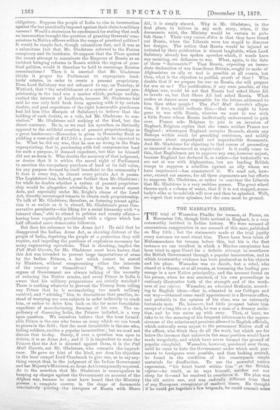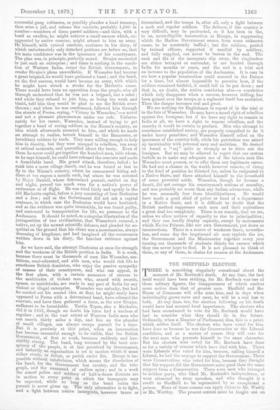THE MARHATTA REBEL.
THE trial of Wassadeo Phadke for treason, at Poona, on November 5th, though little noticed in England, is a very noteworthy incident in Indian history. We were accused of unconscious exaggeration in our account of this man, published on May 24th ; but the statements made at the trial justify every sentence we used about him. There have been trials of Mahommedans for treason before this, but his is the first instance we can recollect in which a Hindoo conspirator has been tried in open Court for a definite attempt to overthrow the British Government through a popular insurrection, and in which trustworthy evidence has been produced as to his objects and his plans. Wassadeo was no deceit, but a rebel, who aimed at a throne, or at all events, at becoming the leading per- sonage in a new Native principality, and the account found on his person, when he was arrested, of his own proceedings is curiously illustrative both of the strength and of the weak- ness of our regime. Wassadeo, an educated Brahmin, accord- ing to English ideas—that is, educated in our Colleges and our way—obtained some small appointment in a Revenue office, and probably in the opinion of his class, was an extremely fortunate man. He, however, had little prospect before him except of a long life as a clerk, he was a man of a dreamy ambi- tion, and. he was eaten up with envy. That, at least, we take to be the meaning of his frequent references to the oppres- siveness of the salaries and pensions allowed to English officials, which naturally seem unjust to the permanent Native staff of the offices, who think they do all the work, but which are far below the incomes that natives in the same position would have made irregularly, and which have never formed the ground of popular complaint. Wassadeo, however, pondered over them, until he came to hate the Government under which such pay- ments to foreigners were possible, and then looking around,
he found in the condition of his countrymen ample materials for disaffection. To use the powerful native expression, "his heart burnt within him' at the British
rdgime—he could, as he says himself, neither eat nor sleep for it—and he resolved to overthrow it. His plan was the old native one, and was radically different from that of any European conspirator of modern times. He thought if he could get together a few brigands, he could commit some
successful gang robberies, or possibly plunder a local treasury, then seize a jail, and release the convicts, probably 1,500 in number—numbers of them passed soldiers—and then, with a band so swollen, he might achieve a small success which, ex- aggerated by native rumour, might attract to him an army. He himself, with cynical candour, confesses in his diary, of which unfortunately only detached portions are before us, that his main confidence was in the ignorance of his countrymen. The plan was, in principle, perfectly sound. Sivajee succeeded in just such an enterprise ; and there is nothing in the condi- tion of Western India, except the British Government, to render Sivajee's plans unworkable. If Wassadeo had become a great brigand, he would have gathered a band ; and the band, on the first success, would have become an army, with which he might have struck a stroke for the Marhatta cause, There would have been no opposition from the people, who all through understood that he was not a brigand, but a rebel ; and while they refused to join him, as being too weak and timid, told him they would be glad to see the British over- thrown ; and when he was condemned, followed him through the streets of Poona, crying, "Victory to Wassadeo,"—a novel and not a pleasant phenomenon under our rule. Unfortu- nately for his career, Wassadeo, instead of trying to get together a band of roving soldiers in the Nizam's country, an idea which afterwards occurred to him, and which he made an attempt to realise, betook himself to the Ramoosies, or hereditary robbers by trade. They were willing enough to help him in dacoity, but they were unequal to rebellion, ran away at critical moments, and quarrelled about the booty. Even of them he never could get together the hundred men, with whom, as he says himself, he could have released the convicts and made a formidable band. His grand attack, therefore, failed ; he sunk into amore village daeoit, and he was forced at last to fly to the Nizam's country, where he commenced hiring sol- diers at ten rupees a month each, but where he was arrested by Major Daniell, whose determined pursuit, carried on day and night, proved too much even for a native's power of endurance or of flight. He was tried fairly and openly in the old Marhatta capital, before a jury consisting of four Brahmins and a Jew ; and as the Government did not ask a capital sentence, in which case the Brahmins would have hesitated, and as the evidence was quite irresistible, he was found guilty, and sentenced to transportation for life, we presume to the Andamans. It should be noted, as a singular illustration of the juxtaposition of two civilisations, that Wassadeo's counsel, a native, set up the newest scientific defence, and pleaded for ac- quittal on the ground that his client was a monomaniac, always dreaming of kingdoms, and had imagined all the occurrences Written down in his diary, the heaviest evidence against him.
As we have said, the attempt illustrates at once the strength and the weakness of the British position in India. It is weak, because there must be thousands of men like Wassadeo, am- bitious, semi-educated, and able men, who would risk life to Overthrow British dominion, who enjoy the passive sympathy of ma891313 of their countrymen, and who can appeal, in the first place, with a certain assurance of success to the multitudes of violent men who, armed with swords, spears, or matchlocks, are ready in any part of India for any violent or illegal enterprise. Wassadeo was unlucky, but had he carried out his second idea at first, he might easily have appeared in Poona with a determined band, have released the convicts, and have then gathered a force, as the new Sivajee, sufficient to be formidable. Tantia Tepee, also a Marhatta, did it in 1857, though no doubt his force had a nucleus of regulars ; and in the vast extent of Western India men who can march thirty miles a day, and live on the plunder of small villages, can always escape pursuit for a time. But it is precisely at this point, when an insurrection has become successful enough to be visible, that the British Government, at first so weak, becomes suddenly and irre- sistibly strong. The band, long screened by the tacit con- spiracy of the people, is at last perceived by Government, and instantly an organisation is set in motion which it must either evade, or defeat, or perish under fire. Escape is im-
possible without subdivision' which means the dissolution of the band, for the Government has cavalry, and the tele-
graph, and the command of endless spies ; and in a week the armed police and soldiery of half-a-dozen districts are in motion to every point at which the insurgents may be expected, while so long as the band exists the pursuit is never given up. The only alternative is to fight, and a fight between native insurgents, however brave or determined, and the troops is, after all, only a fight between a mob and regular soldiers. The defence, if the country is very difficult, may be protracted, as it has been in the, to us, unintelligible insurrection at Rampa, in suppressing which the Madras Government seems, from some unknown cause, to be constantly baffled ; but the soldiers, guided by trained officers, supported if needful by artillery, and fully supplied, can never be beaten in the end. The rank and file of the insurgents slip away, the ringleaders are either betrayed or surrender, or are hunted through India for months or years, and the end is a trial and an increase to the population of the Andamans. It is easy to see how a popular insurrection could succeed in the Deccan for a time, but almost impossible to perceive how, if the soldiers remained faithful, it could fail to be put down ; and that is, no doubt, the native conviction also—a conviction which only disappears when a success, however trifling, has been gained over the troops, or a regiment itself has mutinied. Then the danger becomes real and great.
We see nothing for Englishmen to repent of in the trial or in the fate of Wassadeo. He may have a moral right of rebellion against the foreigner, but if we have any right to remain in India at all, we have a right to repress rebellion, and the anarchy it would be certain to produce. Men who attempt to overthrow established society, are properly compelled to do it under heavy penalties; and Wassadeo himself relied on the ignorance of the country-folk, while his patriotism was mixed up inextricably with personal envy and ambition. He desired to found a " raj " quite as strongly as to drive out the foreigner. But we may be allowed to regret that our system forbids us to make any adequate use of the talents men like Wassadeo must possess, or to offer them any legitimate career. He had not a chance in the world, however remote, of rising to the kind of position he thirsted for, unless ha emigrated to a Native State, and there attached himself to the household of some powerful noble. Wassadeo, though he became a dacoit, did not outrage his countrymen's notions of morality, and was probably no worse than any Indian adventurer, while he was unusually free from bloodthirstiness. He would have made a good chief of police or head of a department in a Native State, and it is difficult to doubt that the British method suppresses such men and their aspirations a great deal too completely. There is no remedy, that we see, unless we allow natives of capacity to rise to principalities ; and they can hardly display capacity, except by movements which Native Princes, like our own Government, put down as insurrections. There is a source of weakness there, neverthe- less, and some day the imprisoned air may explode the ice, the Government and the Missionaries together every year turning out thousands of students thirsty for careers which they can never hope to find. It is not pleasant to think of them, or any of them, in chains for treason at the Andamans.







































 Previous page
Previous page